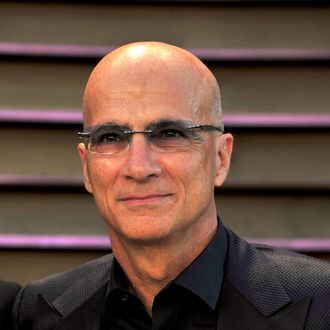
Reports that Apple is preparing to drop $3.2 billion on Beats, Dr. Dre and Jimmy Iovine’s headphones and music-streaming business, caught a lot of tech-world watchers off guard. “We are struggling to see the rationale behind this move,” one analyst wrote. Steve Jobs biographer Walter Isaacson wasn’t so surprised. After the Beats news broke, he told Billboard that Iovine and Steve Jobs had a great working relationship. Iovine was instrumental in getting record labels signed up with iTunes, and now Isaacson thinks Jobs’s successor, Tim Cook, wants Iovine to work his magic on Apple’s TV business. Others have speculated that Iovine is being brought in by Apple to “revamp and run its whole music strategy.” Either way, Iovine is likely to wield serious power at Apple when this deal is consummated. In an attempt to figure out what he’ll do with that power, we pored over years of statements Iovine has made about music, the internet, and digital content in general. Here are the relevant bits:
On the best model to compete with free music:
“Let’s say we had a subscription service, for lack of a better word, but only this service was in an environment that you could go in and know everything about that artist, artists that are related to that artist, credible playlists by unique people, all the videos in one place, all this original content … I think that’s one of the things that can turn the tide.” —Artist House Music
On advertising:
“The record industry has for a very, very long time has missed the opportunity on advertising. We’re the only people in the world that give away the content, someone else advertises around it and we call it promotion. That is just naive.” —All Things D
On the importance of curation:
“There is a sea of music, an ocean of music and absolutely no curation for it. Your friends can’t curate for you. No one knows what song comes next.” —All Things D
“… What’s missing now is the complete thought of music. An occasional album gets made that’s great, but people need navigation through all this music and somebody to help curate what song comes next.” —Time
“Right now, somebody’s giving you 12 million songs, and you give them your credit card, and they tell you ‘good luck.’ You need to have some kind of help. I’m going to offer you a guide. You don’t have to use it, but it’s going to be there, and it’s going to be a trusted voice, and it’s going to be really good.” —All Things D
And why he can do curation best:
“Most technology companies are culturally inept. I don’t care what they do, they’re never going to get curation right. That’s not what they do. The way content companies never get technology right, they never get culture right. So they can hire anyone they want to sing in front of their commercials, but they’re not going to get that right. They’re not going to get curation right. And we’re going to be miles ahead of them.” —All Things D
On the smartphone’s importance to the music industry:
“Music has to make a graceful entrance into the phone. The music industry needs the phone, and unless there’s a solution that makes music easy for everyone, I don’t believe we ever really move the needle.” —The Hollywood Reporter
On digital sound:
“Right now sound is decimated. The digital revolution, as far as we’re concerned, is what went terribly wrong. Yeah it made TVs look better. It makes video better. It takes film better. It takes sound horrible. It’s really decimated the emotion of the sound of music.” —Bloomberg
On the subscription music model:
“But I was always trying to push Steve [Jobs] into subscription. And he wasn’t keen on it right away. [Beats co-founder] Luke Wood and I spent about three years trying to talk him into it. He was there, not there … he didn’t want to pay the record companies enough. He felt that they would come down, eventually.” —All Things D

